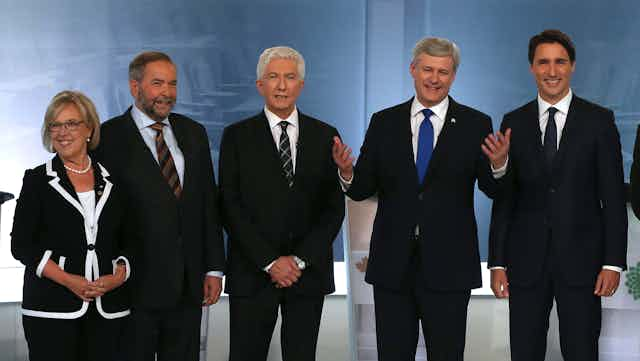Surprise! Electoral reform in Canada is happening after all.
No, that’s not just public relations spin. Electoral reform remains a Liberal broken promise, and has received considerable ink. But the 2019 election will still be different.
This October, the Liberals announced the creation of an Independent Debate Commission to organize leaders’ debates — one in each official language for the next election. The commission will assume the role traditionally occupied by broadcasters, and the intention is to bring more transparency and accountability to the leaders’ debates.
It may not be the electoral reform you were hoping for, but it is one we needed all the same.
Leaders’ debates are a key part of national elections. For decades, millions of Canadians have tuned in to watch party leaders present their ideas, spar with each other, and wait for the “knock-out” line that can change the trajectory of party fortunes.

These are events ripe with promises, new policy ideas, hard criticisms of opponents and candid moments. They are at the core of democratic deliberation. But up to this point, Canadians have known very little about how the debates have been organized because the process was opaque.
Prior to the 2015 election, the televised debates were organized by a consortium of broadcasters and the major parties. Their closed-door negotiations determined the format, the debate topics and which party leaders received an invitation to participate.
Exclusion from the debates, and why, has been a contentious issue for Canadians.
Preston Manning left out
Reform Party leader Preston Manning was excluded from the 1988 debates despite running 72 candidates. In 2008, it was alleged that two leaders threatened to boycott the debates if Green party leader Elizabeth May was invited. May was eventually able to participate, but was shut out again in 2011.
Canadians were told this was an “editorial decision” by the consortium. The lack of transparency on these decisions is one thing, but the notion that a party leader could threaten a boycott if they didn’t get their way raises democratic concerns.
The independent commission will address a number of issues, especially around leader participation. Two of three criteria must be met for participation in the 2019 debates. A party must:
– Have a sitting MP at the time the election is called.
– Intend to run candidates in at least 90 per cent of ridings.
– Obtain four per cent of the vote in a previous election or have a legitimate chance to win seats in the upcoming election, as determined by the commission.
Under these terms, May’s participation would have been secure in 2008.
It could also provide an opportunity for Maxime Bernier, the leader of Canada’s newest party, to present his platform to voters.
Read more: What I learned at a People's Party of Canada rally
Does the last criterion, where the commissioner determines whether a party has a “legitimate chance to win seats,” give the commission too much discretion? Maybe.
But the Canadian party system is not, and never has been, static. Parties come and go, and there needs to be a way for the leader of a new party who has caught the imagination of Canadians to participate in the debate.
We also believe the criteria are enough to prevent fringe parties from flooding the debate stage.
A more transparent process
With an impartial debate commissioner overseeing the organization of the debates (the nominee is former Gov. Gen. David Johnston), the marquee event of the election campaign is positioned to become far more transparent and accountable to Canadians.

For what it’s worth, the government has also heeded the advice of the media organizations that have been involved in the process in the past. There is wide recognition that the debates are a major television event; professionals will be hired to produce a high-quality broadcast.
Canadians shouldn’t fear grainy footage and fern plant props simply because an independent commission has organizational control over the debates. The debate will be for the couch surfers and the cord cutters alike, airing on a variety of platforms.
The establishment of this commission has been quite extensive, involving an online consultation, five regional roundtables with experts and stakeholders (one of which we participated in) and an all-party parliamentary committee that held hearings and issued a comprehensive report.
There will be hiccups
Does this mean the 2019 debates will be perfect? Probably not. We expect hiccups in terms of process and production. Parties are not compelled to participate, and this could be problematic, but we doubt major party leaders will opt out of the commission-sponsored debates.
Other organizations can still choose to produce their own debates, like the Munk Centre did in 2015.
The government is going slowly, hoping to get this right. After the election, the commissioner will report to Parliament the good, the bad and the ugly of the debates and provide recommendations that would inform the potential creation of a permanent debate commission.
Canadians should not only watch, but keep watch over, the 2019 debates. The leaders’ showdowns should be “the peoples’ debates,” and the creation of the debate commission goes a long way to getting us there.

